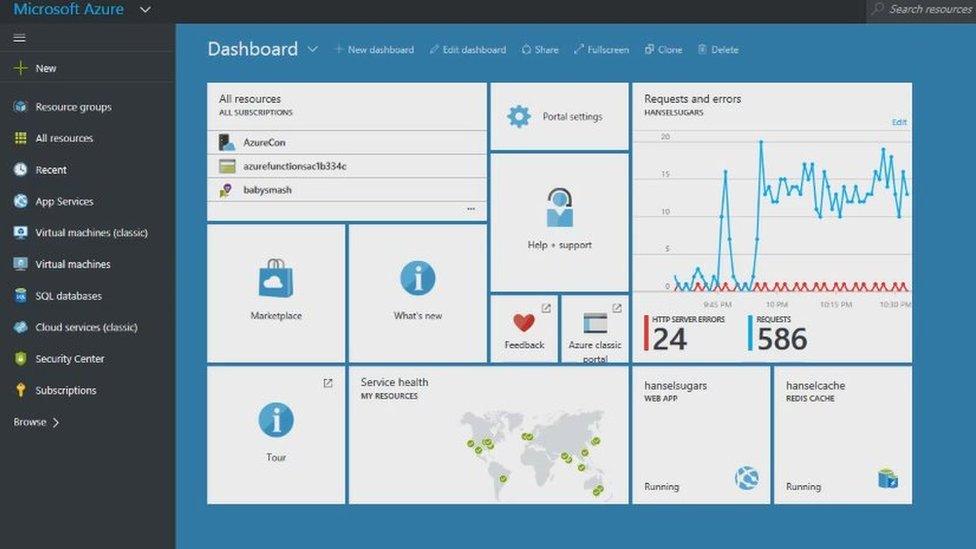Microsoft's UK data centres power up cloud services
- Published

Offering cloud services from within the UK may help convince clients that their data is secure
Microsoft has announced that its first UK cloud computing data centres are up and running.
The facilities are located in London, Durham and Cardiff. They should help the US company sell its online services to the public sector and other bodies that handle sensitive data.
The Ministry of Defence and an NHS trust are among those set to adopt the internet-powered products as a result.
Amazon is set to open its own rival UK data centres soon.
Mike Stone, chief information officer at the Ministry of Defence, said he first approached Microsoft with the idea of opening local facilities two years ago.
At the time, he said, the MoD was using software that had not been updated in years.
"We were still on Windows XP, for instance, and all of the applications were from 2003 or prior to that," he told the BBC.
"I took the view that the services we were providing were unfit for purpose. The idea is to provide a different capability that fully exploits the power of the cloud and mobility.
"We can now work on documents collaboratively and understand more about the ways we are working - we will be able to see how much time teams are spending in meetings, on email and on the phone."

Microsoft says that its Azure cloud computing platform can "handle any workload"
'Secure data'
Microsoft first revealed its plan to set up UK-based data centres last November.
They now provide a local version of its Azure services, which allow customers to store data and offload processing tasks.
Clients are only charged for what they use and can easily alter their requirements at short notice. This can prove substantially cheaper than maintaining their own computer servers, although a hybrid approach is also possible. The risk, however, is that if something goes wrong it can cause problems for many organisations at once.
The UK data centres also mean Microsoft is able to offer its online suite of Office 365 productivity apps without sending data overseas.

Office 365 provides access to the latest versions of Microsofts apps
It hopes this will reassure clients that their information is secure.
Microsoft is, however, fighting a long-running legal battle, external against the US government, which believes it has the right to force domestic companies to surrender data even when it is held overseas.
"The MoD had always considered itself as a special case with bespoke and disparate ICT [information and communications technology] solutions, but is now having to be far more commercially minded in the face of financial pressures," said Daniel Jones, an analyst at the consultancy Kable.
"Other areas of the public sector have also held off migration to the cloud for various reasons, including fears over data sovereignty and the complexity of the task.
"But no-one has a more complex environment than the MoD's ICT network, so that should provide a degree of reassurance to other potential customers."

The Ministry of Defence hopes to save money by adopting Microsoft's cloud services
To start with, the MoD's 230,000 staff will not be allowed to store "classified" documents on Azure, but Mr Stone said this restriction might be relaxed over time.
"Even though legally, we can keep all of our data anywhere in the European Union, when it came to defence information, it did not feel right to me that it was stored outside the UK," he added.
"That's why I asked [Microsoft's chief executive] Satya Nadella to come."
Public sector targets
In addition to the MoD, other new clients include:
South London and Maudsley NHS Foundation Trust, which wants to make it easier for its mental health specialists to handle work outside its hospitals
Capita, the outsourced services provider, which will be using Azure to power online tools for social care workers
Careflow Connect, a chat app for healthcare professionals. Its owners believe that being able to keep patient-related messages within the UK will reassure NHS managers
"We're expecting that legal services, banking, utilities and some of those more regulated sectors as well as the public sectors will now find ways to benefit from the cloud," said Microsoft UK's general manager of marketing Nicola Hodson.
Amazon does not offer an equivalent to Office 365, but its AWS cloud computing division remains more popular than Azure.

Amazon has not said where it will build data centres in the UK
AWS accounted for about 31% of the global cloud infrastructure service market between April and June, according to Synergy Research, external.
In contrast, Microsoft had an 11% share.
Amazon also announced plans to build UK data centres last year, but is yet to confirm when they will open.
- Published29 April 2016

- Published6 June 2016

- Published10 November 2015

- Published4 December 2014

- Published19 November 2014
